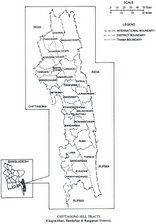 Naeem Mohaiemen, Rahnuma Ahmed
Naeem Mohaiemen, Rahnuma Ahmed[Samakal, May 13, 2007]
http://shobak.wordpress.com/2007/05/16/zero/
[Blog editor's note: This is a translated version of the original Bangla article titled "Amader Bioger Khatar Manushjon" published in Samakal. To read the original Bangla article please visit: http://shobak.files.wordpress.com/2007/05/biyogerkhata.pdf
(if you can't read PDF, you may need to download Sutonny font). (HTML)http://www.shamokal.com/details.php?nid=60687]
THE Sadarghat mayhem and ten deaths is another headline of lives choked off, too soon and for unfathomable reasons. Whatever the actual sequence of events, the morals squad is certain it’s all due to oposhongskriti. Allegations of “dancing girls”, sex, and alcohol — the story grows in every telling. A patronizing attitude towards youth (that has to be protected from itself) presumes that the only solution is to erect a Saudi style “Department To Promote Virtue & Prevent Vice.” Good luck.
But something else about this tragedy caught my attention. Along with horrific pictures of young bodies being pulled out of the water, newspapers reported that three investigation commissions had already been formed to investigate the deaths. Not only that, they had been ordered to submit their report within twenty fours. Speedy justice…
By relevant coincidence, another news was published on the same day. A one-person investigation committee was finally formed to look into the brutal torture-murder of Adivasi activist Chales Ritchil. A committee headed by retired judge Mohammed Rafiuddin. After calling a few lawyer friends, I couldn’t find anything about this particular judge’s track record. Low profile personality: perhaps a good thing, perhaps not.
Here’s an equation circling in my head. When the victims of senseless tragedy are Bengali, our government has the ability to put together not one, but three investigation committees overnight. When the suspect villains are working class launch workers, “youth gone wild”, or everyone’s favorite monster-under-the-bed oposhongskriti, the justice system goes into hyper-drive. People will be arrested, punishments doled out, licenses taken away, and new rules dreamed up to control behavior.
But when the case involves an Adivasi — by our reckoning a sub-human — it takes over a month of sustained national (and international) outrage, a petition signed by over 500 citizens (petitiononline.com/CholesR1/petition.html), alert notices from groups like Human Rights Watch, and diplomatic back-channel conversations to finally push the government to appoint a ONE-person committee. The announcement may also have been timed to avoid embarrassment for Faruq Sobhan’s goodwill tour of the US. How much headway one retired judge will have, in investigating a case that involves powerful quarters, is pretty clear to me. And if justice was the intention, why is the family still not being allowed to file a case?
We have seen many committees in our lifetime, they’re often just a process to mothball controversy. Perhaps the committee will discover that Chales was running, or fell from a window, or was trying to fight back, and somehow in that process destroyed his eyes and testicles, break his fingers, and sustain massive injuries all over his body. Gravity is your friend.
Power always counts on short memories — we will forget and move on, we always do. The government is also short sighted in thinking that closing ranks and protecting their own is more important than setting an example by punishing torturers.
But why get upset only at this government? The rot starts at the root of history, and it starts with all of us. Sheikh Mujib led a movement based on opposition to an imposed “Pakistani” identity, destruction of language, and refusal to give regional autonomy. He then turned around and said to the Paharis, only two years after liberation, “Forget your ethnic identity, be Bengalis.” The 1970s version of shushil shomaj, vocal on other issues, quietly went along. Mujib’s baton on ethnic minorities was picked up by Ziaur Rahman, then H M Ershad, then…on and on.
After shafting the CHT Paharis and Flatland Adivasis for decades, we were quaintly shocked when Paharis picked up guns, and Adivasis picked up protest banners. You’re supposed to be gentle people — available as exotica and national color, not as equals who fight back and demand rights.
Bangladesh for Bengalis. Paharis and Adivasis, if you don’t like it, there are now excellent bus services to India. Allah Hafez. Justice and rights — those big words are for us, no space for you at the table.
Until our fundamental national racism is shattered, one-person committees, delayed and deferred, can only be window-dressing. We will continue to be the masters. And you — well you’ll be dead, arrested, tortured, marginalized, jobless, poor.
Less than zero
........................................
Writer's comment:
Anthropologist Rahnuma Ahmed encourages many of us to practice mental
decolonization, by returning to writing and working in Bengali. This
is especially relevant for those educated in English systems, either
in Bangladesh or abroad. Rahnuma has been practicing this for years,
but many of us lag because we grew up in Bengali medium education but
never learnt to type in Bengali. The Bengali keyboard is far more
complex than English-- qwerty skills don't transfer.
A Bengali newspaper editor recently said to me, "what's the point of
writing for so few people?" He was referring to the fact that the
largest circ english language paper is still dwarfed by Bengali
language papers' circulation. The counter argument (in praise of
English) can be the need to connect local and global struggles, which
needs the universal connector.
Is writing in English fundamentally an elite exercise in this country?
Or is there a way to change this? I have been infecting my English
text with Bengali words (untranslated) but this is only a stopgap. Can
we imagine a totally hybrid ("mongrel" to detractors) language in our
futures?
Meanwhile, fed up with my typing recalcitrance, Rahnuma recently
dropped off a Bengali keyboard at my home. No more excuses....
This joint editorial below was published only in Bengali (in SAMAKAL),
and for a change not published in my usual English haunt DAILY STAR.

No comments:
Post a Comment